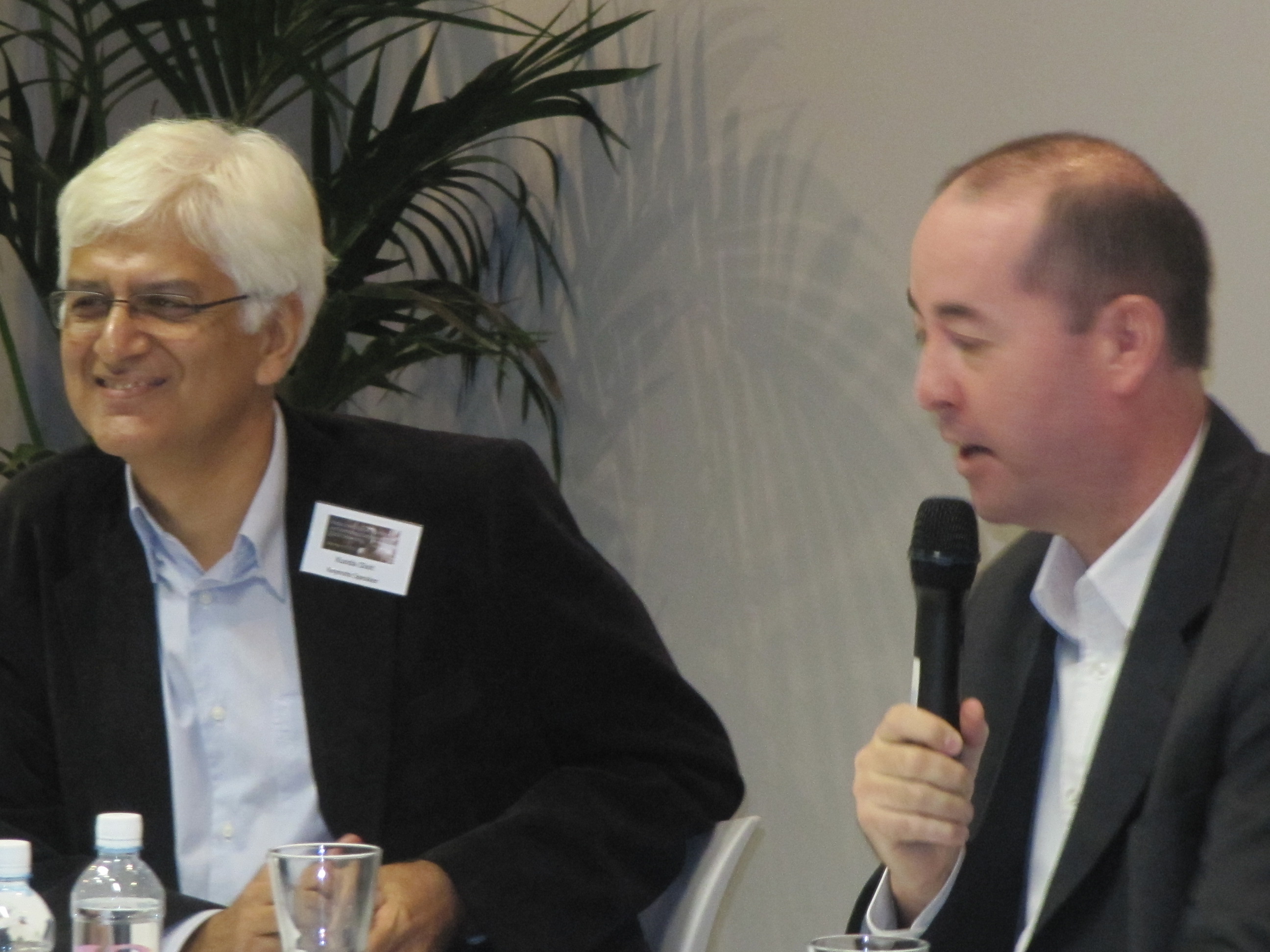
Kunda Dixit with Jon Stephenson on the panel at the MIJT Conference today. Photo: PMC
4 December 2010
Rose Rees-Owen
AUT University’s Pacific Media Centre has today hosted an investigative journalism conference to discuss the challenges and issues facing aspiring and existing investigative journalists.
A keynote plenary discussion, focusing on the future of investigative journalism, featured prominent investigative journalists from New Zealand, Australia and Nepal.
Wallace Chapman, breakfast host on KiwiFM and presenter of TVNZ7’s Backbenchers, kicked off the debate by quoting the British Journalism Review: “News journalism is in deep crisis, newspaper readership is falling, the audiences for television is shrinking, and young people in particular seem to be less interested in traditional news consumption.”
The quote set New Zealand investigative journalist Jon Stephenson off on a controversial discussion, and a lively debate with Professor Wendy Bacon from the University of Technology in Sydney.
Stephenson gave reference to Chris Trotter’s last words in the Independent before it shut down, which he said “was a great paper in its hey-day.”
Trotter said, “Combine the expectations of 18 year-old Kiwi males and females, and the result is unlikely to fill a 54 year-old New Zealander’s heart with confidence. Self obsessed, over-confident, ruthless and hungry for all the material values of success, these first time voters are perhaps the least reliable to Australian and New Zealand values.”
Blaming the younger generation
Stephenson continued to jest that the only way you are going to get young people interested in issues such as Iraq is by having a show like Survivor where torturers get voted off.
Wendy Bacon waved her hands in protest and her hand shot up in retaliation.
“I don’t know what I would feel if I was young, but I think I would feel a little pissed off,” she said.
“We have more students wanting to enrol in investigative journalism than anything else.
“There is a huge capacity to exaggerate, and every generation looks at young people, and says the problem is with young people but I actually think the problem lies with our generation giving up.”
Bacon was clearly against the domesday predictions rife within the industry about the future of journalism.
Chapman asked the panel “If we promoted investigative journalism in the same way as we promoted Close-up, with large billboards and advertisements, then would there be more interest in it?”
In response, Stephenson said, “We have been feeding people bullshit for so long they have forgotten what good journalism is like. If we feed people McDonalds everyday, and then one day we actually give them a good meal, it’s no shock they throw-up.”
Stephenson conceded there are many good young journalists in the United States, but here in New Zealand young journalists are more interested in the “theatre of journalism.”
‘Superficial interest’
“When I talk to young journalists wanting to be war correspondents, I generally find their interest in it is very superficial,” he said.
“It’s often seen as a way of advancing their career, to get ‘a bit of Iraq on their CV.’”
Stephenson then launched an attack on student journalists for writing blogs.
“They have names like ‘foreigncorrespondent.com,’” he said.
“You would think that this was an offshoot of The Guardian, but it is actually a student journalist with no experience.”
Bacon shook her head in disagreement.
Scattered amongst the room were postgraduate journalism students, from AUT University, as well as students from UTS in Sydney.
When prompted by the audience, a brave voice for the youth spoke out.
“I think the issue is that there is so much information available,” said the young student.
“We do spend less time at each place we visit online, but the reason is that we can browse much more efficiently for what we are interested in and when we find a story of interest, we click on it and go more in-depth.”
The ‘value’ of immediacy
She used the example of Twitter as a way to skim the news content of boundless information, and then hone in on the subjects that appear more striking.
It was one way of explaining what audience member and AUT University lecturer Associate Professor Wayne Hope called “the major news value of immediacy.”
Stephenson argued that in some way due to the rise of new media such as Twitter, young people tend to have shorter attention spans, are brought up on immediacy, and aren’t interested in reading 10,000 word articles.
Before ending, Bacon suggested that the panel was in more agreement than it appeared.
“I think Jon and I are in some agreement as to the issues around investigative journalism,” she said.
“It is more about the causes of the problem that we differ.”
The Media, Investigative Journalism and Technology Conference continues tomorrow with further presentations, a plenary session on peace journalism and an investigative masterclass with journalists and students.


